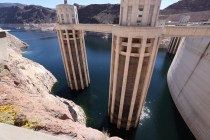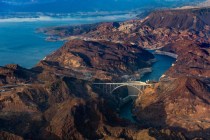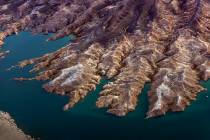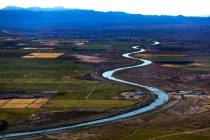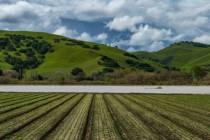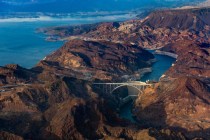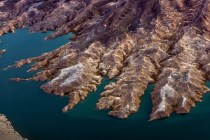The Nevada Assembly voted 30-12 in favor of a wide-ranging water conservation bill that could lead to caps on residential water use in Las Vegas.
Lake Mead
After dropping more than 50 feet since 2000, latest forecasts show Lake Mead rising by roughly 22 feet by the end of the year.
The U.S. Drought Monitor says storms dropped so much water this winter that less than one-quarter of Nevada remains in drought.
The two proposals show that “the tools available to the federal government are very blunt,” said John Entsminger, general manager of the Southern Nevada Water Authority.
Since the 1980s, Southern Nevada has been banking its unused Colorado River water, storing hundreds of billions of gallons away underground and in Lake Mead.
The federal government laid out a pair of options to cut water use along the Colorado River and keep Lake Mead and Lake Powell from shrinking any more.
If approved, the legislation would make Nevada the first state to give a local water agency permanent say over how much water residents can use.
Forecasters expect the Colorado River to see some of its highest flows in more than a decade as snow melts off the Rockies this spring and summer.
A new ramp was to allow slightly more access to declining Lake Mead, but the effort has been slowed.
Nevada gets less than a 2 percent cut from the Colorado River’s waters, but the state actually uses far more water than that each year.
While the bounty has eased drought conditions, experts warn that the dense Sierra Nevada snowpack will soon melt, potentially unleashing torrents of water and creating considerable concern about spring flooding in valleys, foothills and communities below.
A bill would create a new program to use satellite imagery to estimate how much water is lost to evapotranspiration from crops.
The remains of a man who likely drowned nearly 40 years ago at Lake Mead National Recreation Area were found in October.
“Disastrous conditions have reshaped Lake Mead National Recreation Area’s one and a half million acres of incredible landscapes and slowly depleted the largest reservoir in the United States,” the senators wrote in a letter to the National Park Service.
The Southern Nevada Water Authority is evaluating whether changes need to be made to its lowest intake straw in order to protect water quality as Lake Mead continues to shrink.













